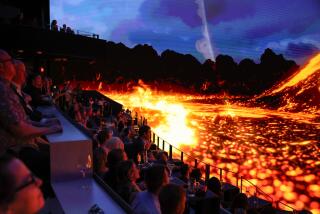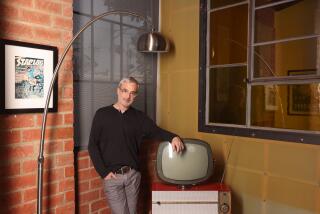‘Cosmos: A Spacetime Odyssey’ is a bold adventure for mainstream TV
“It’s time to get going again.”
With these words, host and astrophysicist Neil deGrasse Tyson kicks off the new documentary series, “Cosmos: A Spacetime Odyssey.” Premiering on Fox, the National Geographic Channel and eight other affiliated networks Sunday night, it is a follow-up to “Cosmos: A Personal Voyage,” the groundbreaking and hugely popular 1980 PBS series hosted by astronomer Carl Sagan.
Tyson, strolling along the scenic California coastal cliffs of Monterey — just as Sagan did in the opening minutes of the original — is talking about bringing the franchise to a new generation, but with a command that can also be interpreted as a mission statement. The first “Cosmos” premiered at a time of great public enthusiasm for space exploration, when memories of Neil Armstrong’s historic walk on the moon remained fresh.
This “Cosmos” arrives in a much different climate: Two and a half years after the end of the shuttle program, NASA’s budget continues to dwindle, now comprising less than one half of 1% of all federal expenditures, and fewer kids dream of becoming astronauts.
BEST TV OF 2013 Lloyd | McNamara
And that, says writer and executive producer Ann Druyan, is something she hopes “Cosmos” will change.
“There are all these Carl Sagans out there who are about to be inspired to teach or read or work in science,” says Druyan, also Sagan’s widow. “That would be amazing — to have a public that will support science, but also a public that will also think critically and be less subject to the forms of manipulation that we all know are happening commercially, spiritually, governmentally.”
All of which makes “Cosmos,” an educational, albeit entertaining, documentary series with a pro-science agenda, an expensive gamble for a broadcast network like Fox. (After Sunday’s simulcast premiere, new episodes will run Sundays on Fox and will be rebroadcast with added material Monday nights on National Geographic.)
“I don’t think all entertainment should be empty calories,” says Fox Entertainment Chairman Kevin Reilly. “I think the best of entertainment nourishes you as well.”
As he points out, “Cosmos” may be an unusually intellectual project for mainstream TV, but it also grapples with subjects that are, in the most literal sense of the word, universal. And in an era of dwindling audiences, “Cosmos” is the type of bold event programming that networks are willing to try to retain viewers who might otherwise flee to cable or online services like Netflix.
In that regard, “Cosmos” benefits from an executive producer, Seth MacFarlane, with a large fan base and résumé full of hits. When the follow-up was officially announced at Fox’s upfront presentation last May, many were shocked to learn the “We Saw Your Boobs” guy was attached to such a high-minded project. But MacFarlane, the force behind the bawdy animated series “Family Guy” and “American Dad!”, says there has always been overlap between the “two worlds of nerddom” of animation and science.
Druyan and Tyson had tried for several years to revive “Cosmos.” Despite interest from several networks, development stalled because Druyan was determined to retain creative control. “I wanted to be able to protect Carl’s legacy,” she says.
MacFarlane, eager to use some of his TV fortune to fund scientific research, reached out to Tyson for ideas. Instead, Tyson asked if he’d lend his support to the “Cosmos” reboot, thinking the funnyman might be able to pay for a pilot. MacFarlane immediately suggested bringing it to Fox.
“For about 12 seconds I thought that was the stupidest idea I’ve ever heard in my life,” Tyson recalls. But as he considered Fox’s corporate resources and global reach, he realized there was “no better platform.”
After hearing the pitch, Fox executives gave the series a 13-episode order and granted Druyan full creative control. MacFarlane, whose shows have been tremendously successful for the network, is adamant his involvement had little to do with getting such an easy greenlight. “I think I maybe helped them get the meeting a little quicker,” he says when pushed.
The project was also boosted by the rising profile of Tyson, director of the Hayden Planetarium in New York, who has rapidly evolved into a kind of rock star scientist thanks to his captivating appearances on “The Colbert Report” and “The Daily Show.”
Once “Cosmos” was a go, Druyan and co-writer Steven Soter spent 11 months crafting the 13 episodes. The new series revives key storytelling devices from the original, including the Cosmic Calendar, which compresses the 13.8 billion-year life span of the universe into a single year. Like Sagan, Tyson will travel through the cosmos in the Spaceship of the Imagination — reimagined here as a shiny black pod. He’ll also trot to picturesque destinations around the globe, from Rome to the Bay of Fundy in Nova Scotia.
PHOTOS: TV shows and their spinoffs
And like its predecessor, “Cosmos” will use human stories to chart the progress of science. Each episode is centered on a historical figure who, as Tyson explains, “came upon a new and emergent scientific truth that conflicted with the social, cultural, political [or] religious dogma” of his or her time.
But there are changes in the “Cosmos” revival that reflect not only the scientific advancements of the last 34 years but also the project’s home on a commercial network with deep pockets.
“Cosmos” boasts of A-list behind-the-scenes talent recruited from the feature-film and series TV worlds. Alan Silvestri, who’s scored such blockbusters as “Forrest Gump” and “The Avengers,” created the music, which was performed by a symphony orchestra. Series directors include Bill Pope, a cinematographer on “The Matrix” trilogy, and Brannon Braga, a writer-producer on multiple “Star Trek” series.
The show contains 1,500 visual-effects shots created by a dozen visual-effects houses, and the historical re-creations by actors in period garb of the original have been replaced by sophisticated animated sequences created by MacFarlane’s team of artists.
PHOTOS: Behind the scenes of movies and TV
Despite, or perhaps, because of the risk involved, Fox is throwing all of its corporate might behind “Cosmos.” The premiere will air across 10 Fox-owned networks — though not, as some have noted, Fox News. Globally, the series will be available on 220 channels in 181 countries in 45 languages, reaching half a billion homes. This massive push, according to Fox, constitutes the largest television rollout in history — and all this from the network that brought the world “The Swan.”
Early reviews of “Cosmos” have been glowing, with critics at Time and New York Magazine hailing it is as an explicit rebuke of fundamentalist thought and anti-science views. The original carried dire warnings about the threat of nuclear holocaust, one of Sagan’s most passionate causes, and the Fox reboot will also touch upon issues of critical contemporary relevance, like climate change.
In his typically outspoken fashion, MacFarlane is frank about his hope that “Cosmos” will get the country “back on track” when it comes to science.
“The space program has decayed to a point that it is incredibly depressing. We as a species are explorers. Why are we stopping? We’ve seen the rise of junk science, of charlatans who are telling us to not vaccinate our children ... the rise of schools questioning evolution. All these things piling up that betray the fact that we’ve lost our way in terms of our scientific literacy,” he says.
More to Read
The complete guide to home viewing
Get Screen Gab for everything about the TV shows and streaming movies everyone’s talking about.
You may occasionally receive promotional content from the Los Angeles Times.






